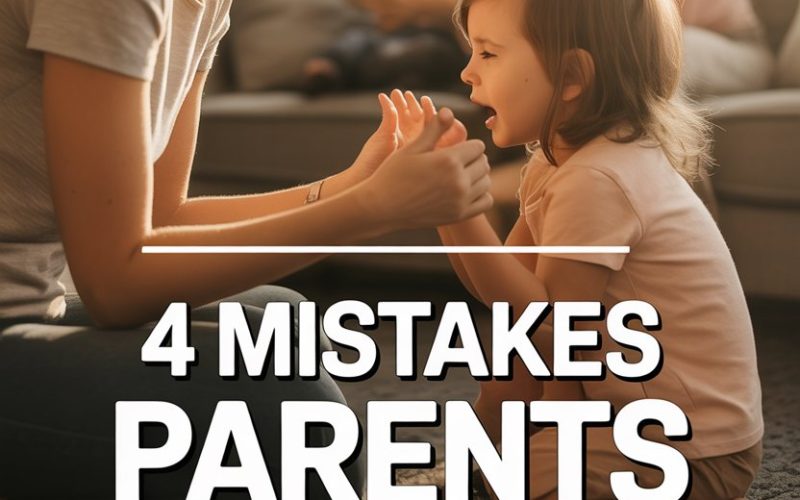Nothing quite tests your patience like a small human in full meltdown mode at the supermarket, on a plane, or yes, even at your own dinner table.
Tantrums are as much a part of childhood (and parenthood) as forgotten socks and sticky handprints on the fridge. They’re loud, unpredictable, and—let’s be honest—a tad embarrassing.
But while every parent has found themselves in the eye of the toddler storm, many fall into a few classic traps when trying to weather the chaos.
Here’s the good news: Everyone gets flustered. Even the calmest, most “Zen” parent you follow online (whose toddler probably eats quinoa without complaint) loses it sometimes.
The trick isn’t to avoid tantrums altogether (dream on), but to steer clear of a few common missteps that can make things tougher for both you and your child.
1. Trying to Reason With a Tiny Tornado
Ever attempted to explain the logic of bedtime to a three-year-old mid-scream? It’s about as effective as reasoning with a goat.
When kids are in the throes of a tantrum, their little brains are more interested in fight-or-flight than your explanation about why we don’t eat crayons, or why biscuits aren’t a breakfast food.
Child development experts highlight that emotional regulation in the prefrontal cortex doesn’t really kick in until later childhood. In other words, your little one’s brain is busy riding a tidal wave of feelings, and logic simply can’t squeeze in.
Harvard’s Center on the Developing Child explains this beautifully: the part of the brain handling reason and impulse control is on a tea break during a meltdown.
Instead of detailed explanations or negotiating (“If you stop crying, you can have the toy”), try simple comfort. Sit nearby. Offer a cuddle if they’re open to it.
Keep your sentences short and gentle—“I see you’re upset. I’m here.” No negotiating with emotional pirates; just let the storm pass.
2. Taking It Personally (And Losing Your Cool)
A red-faced, screaming toddler might feel like a direct attack on your parenting skills, but tantrums are rarely about you.
They’re a normal part of growing up, not a measure of your competence, or a secret sign your child hates your spaghetti bolognese.
Still, when the screaming starts (particularly in a public place), embarrassment can trigger your own stress response. You might feel the urge to yell, threaten, or walk away.
Welcome to the club: virtually every parent has snapped at least once and then replayed the moment in bed at 2 a.m.
The key is to avoid joining the emotional spiral. Studies suggest that parental self-regulation is one of the most powerful tools for helping children calm down.
When you stay calm—even if your internal monologue is less “mindful parent” and more “just let me survive”—you’re showing your child how to handle big feelings.
A few quick tricks that help in the heat of the moment:
- Take a slow, deep breath before responding.
- Remind yourself, “This is my child’s feelings, not my failure.”
- If you need to, turn away for a moment to collect yourself (safety permitting).
This isn’t about being a robot; it’s about giving yourself a moment to choose a response you won’t regret.
3. Giving In to Stop the Noise
The temptation to hand over the chocolate bar, the toy, or the TV remote just for a moment of peace can be overwhelming.
You can practically hear your pre-child self tutting in the background, but when you’re tired and the shrieking echoes off the walls, it’s easy to take the quickest exit.
Here’s where things get sticky: when giving in becomes the standard, small children learn that tantrums are a handy way to get what they want.
Psychologists call this “intermittent reinforcement,” and it’s the very thing that keeps slot machines in business. The occasional jackpot (or chocolate bar) makes the effort seem worth it—and the tantrums keep coming.
The trick is consistency. Once you’ve said no, stick with no (even if every fibre of your being wants to say yes).
This doesn’t mean you can’t offer comfort or acknowledge feelings—“I know you’re disappointed we can’t buy that toy”—but the boundary itself shouldn’t wobble.
If you find your resolve slipping, try stepping away from the situation, or distracting your child with another activity.
You’re not a vending machine, and it’s okay if your child gets upset about a boundary. Those feelings, as inconvenient as they may be in aisle five, are an important part of learning to cope with disappointment.
4. Forgetting to Talk After the Storm
Once the tears stop and peace returns (or nap time mercifully arrives), you may be tempted to pretend the whole episode never happened.
Everyone’s exhausted. Who wants to rehash the drama?
Yet, skipping the “post-tantrum debrief” is a missed opportunity. When your child is calm and their brain is back online, a gentle conversation can teach them how to recognise and handle those big feelings next time.
Children’s emotional literacy grows when adults help label and decode what just happened. Try something like, “You were really upset when it was time to leave the playground. I get sad about leaving fun places too.
Next time, maybe we can try taking a deep breath together.”
You’re not lecturing or punishing. You’re helping your child build the tools they need to cope.
The Raising Children Network suggests these conversations, when kept short and kind, boost emotional skills and improve behaviour over time.
You can even brainstorm together. “What could we do next time if we feel that angry?”
Even a four-year-old can come up with surprising solutions (some more realistic than others—don’t be shocked if “buy an ice cream” features heavily).
When the Next Tantrum Comes (And It Will…)
Parenting isn’t about perfection. It’s about learning from yesterday’s spaghetti-flinging incident and trying a new approach tomorrow.
Tantrums are loud, messy proof your child is learning to deal with a confusing world—and that you, poor sleep-deprived soul, are right there with them.
By steering clear of these four common mistakes, you’ll find those difficult moments get just a little bit easier.
And if you manage to weather the next storm with your dignity (mostly) intact, reward yourself with a biscuit. You’ve earned it.





